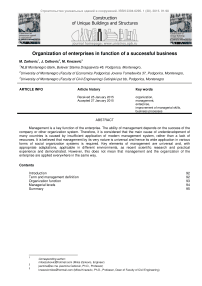Организация предприятий как функция успешного бизнеса
Автор: Жаркович Милош, Четкович Ясмина, Кнежевич Милош
Журнал: Строительство уникальных зданий и сооружений @unistroy
Рубрика: Технология и организация строительства: зарубежный опыт
Статья в выпуске: 1 (28), 2015 года.
Бесплатный доступ
Менеджмент - это ключевая функция предприятия. Качество менеджмента определяет успешность компании или другой организационной структуры. Таким образом, предполагается, что основная причина отсталости многих стран обусловлена недостаточной обеспеченностью современными системами управления, а не нехваткой ресурсов. Считается, что менеджмент по самой своей природе является универсальным инструментом, и следовательно, необходимо его широкое применение в самых различных формах социальных организационных систем. Ключевые элементы управления являются универсальными и адаптированными, подходящими для применения в различных условиях, как показывают последние научные исследования и демонстрирует практический опыт. Тем не менее, это не означает, что менеджмент и организация предприятий применяются повсюду одинаково.
Организации, менеджмент, предприятия, улучшение управленческих навыков, бизнес-процессы
Короткий адрес: https://sciup.org/14322178
IDR: 14322178
Список литературы Организация предприятий как функция успешного бизнеса
- Crosby, L., Gronroos, C., Johnson, S. L., (2002) Who Moved My Value. Customers, not Companies, Create Value, Marketing Management, 11 (5), pp. 10-11
- Johnson, R. A., (1976). Management, systems, and society: an introduction, Pacific Palisades, Calif.: Goodyear Pub. Co p. 13
- Friedman, L. G. (2002) Go to Market Strategy: Advanced Techniques and Tools for Selling More Products, to More Customers, More Profitably, Boston: Butterworth-Heinemann, 274 p.
- Kotter, J. P., Cohen, D. S. (2002) The Heart of Change, Boston: Harvard Business School Publishing, p. 38
- Cherrington, D. J. (1994) Organizational Behavior: The Management of Individual and Organizational Performance. 2nd ed. Boston: Allyn and Bacon, 355 p.
- Kaplan, A. (2014) European Management and European Business Schools: Insights from the History of Business Schools, European Management Journal, vol. 32, issue 4, pp. 529 -534.
- Hammer, M. M.; Champy, J. A. (2009) Reengineering the Corporation: Manifesto for Business Revolution, HarperCollins, ISBN 0061808644, 486 p
- Ćetković, J., Knežević, M., Žarković, M., Murgul, V., Vatin, N. Development and competitiveness improvement of the construction sector in Montenegro (2014) Applied Mechanics and Materials, Vol. 638-640, pp. 2465-2470.
- Jocovic, M., Melovic, B., Vatin, N., Murgul, V. Modern business strategy Customer Relationship Management in the area of civil engineering (2014) Applied Mechanics and Materials, Vol. 678, pp. 644-647.
- Serra, C.E.M., Kunc, M. Benefits Realisation Management and its influence on project success and on the execution of business strategies (2015) International Journal of Project Management, Vol. 33(1), pp. 53-66.
- Bai, Ch., Sarkis, J. A grey-based DEMATEL model for evaluating business process management critical success factors (2013) International Journal of Production Economics, Vol. 146(1), pp. 281-292.
- Dimosthenis, A.D., Mousiolis, T. Entrepreneurship and SME's Organizational Structure. Elements of a Successful Business (2014) Procedia -Social and Behavioral Sciences, Vol. 148(25), pp. 463-467.
- Melovic, B., Jocovic, M., Lugovskaya, I., Vatin, N. Possibilities of Implementing Customer Relationship Management in the Function of Improving the Competitiveness of the Civil Engineering Sector (2015) Applied Mechanics and Materials, Vols. 725-726, pp. 977-983.
- Samson, D., Daft, R. (2005). Management: second Pacific Rim edition. Melbourne, Victoria: Thomson, pp. 42-45
- Winer, R. S., (2001) “A Framework for Customer Relationship Management” California Management Review, 43 (3), 89-106.
- Ford, D. (1990) “Part II: Developing Marketing Strategies” In Understanding Business Markets: Interactions, Relationships and Networks (The Industrial Marketing & Purchasing Group), ed. David Ford, p. 87. London: Academic Press
- Morgan, R. M., Hunt, D. S., (1994) “The Commitment-Trust Theory of Relationship Marketing” Journal of Marketing, 58 (3), pp. 20-38.
- Handy, C. (2006) Understanding Organizations 4th ed. London: Penguin Books, pp. 16-18
- Fournier, S. (1998) Consumers and Their Brands: Developing Relationship Theory in Consumer Research, Journal of Consumer Research, 24 (4), pp. 343-373
- Bowman, D., Narayandas, D. (2004) Linking Customer Management Effort to Customer Profitability in Business Markets, Journal of Marketing Research, 41 (4), pp. 433-447.


